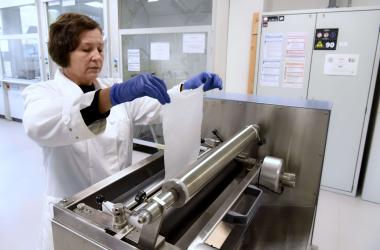Lenzing AG: Volatiles Q3, positiver EBITDA-Ausblick 2025
In den ersten neun Monaten 2025 verzeichnete die Lenzing AG leicht gestiegene Umsatzerlöse und ein höheres EBITDA – zugleich jedoch ein marktbedingt volatiles drittes Quartal. Diese Entwicklung spiegelt die Auswirkungen anhaltender Marktvolatilität sowie Zoll- und geopolitische Unsicherheiten wider. Die mittel- bis langfristigen Perspektiven bleiben jedoch unverändert positiv.
Die Umsatzerlöse der Lenzing AG stiegen in den ersten neun Monaten um 0,7 Prozent auf EUR 1,97 Mrd. (Vorjahr EUR 1,96 Mrd.). Das EBITDA legte um 29,1 Prozent auf EUR 340,4 Mio. (Vorjahr EUR 263,7 Mio.) zu, einschließlich Effekten durch den Verkauf überschüssiger Emissionszertifikate und die Bewertung biologischer Vermögenswerte. Die EBITDA-Marge verbesserte sich auf 17,3 Prozent (Vorjahr: 13,5 Prozent). Das Betriebsergebnis (EBIT) belief sich auf EUR 20,6 Mio. (Vorjahr: EUR 38,3 Mio.), was einer EBIT-Marge von 1 Prozent (Vorjahr: 2 Prozent) entspricht. Hierbei sind Wertberichtigungen auf Vermögenswerte in Höhe von EUR 82,1 Mio. in Indonesien enthalten. Das Ergebnis vor Steuern (EBT) lag bei minus EUR 98,7 Mio. (Vorjahr: minus EUR 33,4 Mio.).
Strategische Weiterentwicklung
Die Lenzing AG verfolgt eine ganzheitlich angepasste Strategie mit klarem Fokus auf wertschaffendes Wachstum. Zu den zentralen Eckpfeilern zählen die Steigerung der operativen Effizienz, die Optimierung der Produktionsstandorte sowie die gezielte Ausrichtung auf margenstarke Premiumprodukte wie TENCEL™, VEOCEL™ und LENZING™ ECOVERO™. Besonders in den Bereichen Hygiene, Verpackung, Filtration sowie medizinischen und industriellen Anwendungen wird weiteres Wachstumspotenzial erwartet.
Um dieses Wachstum nachhaltig abzusichern und die Wettbewerbsfähigkeit langfristig zu stärken, hat das Unternehmen eine strategische Überprüfung des Produktionsstandorts in Indonesien eingeleitet. Die geplanten Maßnahmen – einschließlich einer Anpassung administrativer Funktionen – sollen bis Ende 2027 zusätzlich jährliche Einsparungen von rund EUR 45 Mio. nachhaltig realisieren. Der Vorstand erwartet für das laufende Berichtsjahr Kosteneinsparungen von über EUR 180 Mio. Darüber hinaus investiert das Unternehmen über EUR 100 Mio. in die Standorte Lenzing und Heiligenkreuz und strebt eine ganzheitliche Energieoptimierung an allen Produktionsstandorten um mehr als 5 Prozent an. Für den Standort in Indonesien werden strategische Optionen geprüft, einschließlich eines möglichen Verkaufs.
In dem Berichtszeitraum hat der Aufsichtsrat personelle Weichen gestellt: Das Vorstandsmandat von Christian Skilich, Chief Pulp & Chief Technology Officer, wurde bis Mai 2029 verlängert. Mathias Breuer, derzeit Senior Vice President und verantwortlich für das Performance-Programm, wird ab 1. Januar 2026 CFO und folgt auf Nico Reiner, der sein Mandat planmäßig Ende 2025 beendet.
Solide Finanzposition in einem schwierigen Umfeld
Durch die starke Fokussierung auf Cash-Management ist es der Lenzing in dem Berichtszeitraum gelungen, keine Zweifel an ihrer ausreichenden Liquiditäts-Ausstattung aufkommen zu lassen. So verfügt das Unternehmen zum 30. September 2025 über eine Liquiditätsreserve von EUR 993 Mio. Die Kapitalstruktur wurde durch eine Hybridanleihe über EUR 500 Mio. und eine syndizierte Finanzierung über EUR 545 Mio. gestärkt. Die Nettofinanzverschuldung konnte zum Stichtag um 8,5 Prozent auf EUR 1,4 Mrd. reduziert werden. Bei einer Bilanzsumme von EUR 4,80 Mrd. ergibt sich eine bereinigte Eigenkapitalquote von 30,7 Prozent per 30. September 2025.
Der Cashflow aus der Betriebstätigkeit belief sich auf EUR 284,6 Mio. (Vorjahr: EUR 319,4 Mio.). Der Free Cashflow war mit EUR 110,9 Mio. (Vorjahr EUR 194,0 Mio.) ebenfalls positiv. Zusätzlich lag der Unlevered Free Cashflow bei EUR 192,1 Mio. (Vorjahr: EUR 228,6 Mio.).
Die Investitionen (CAPEX) beliefen sich auf EUR 93,2 Mio. (Vorjahr: EUR 93,3 Mio.).
Ausblick
Das globale Umfeld bleibt volatil. Der IWF erwartet 2025 ein Wachstum von 3,2 Prozent, warnt aber vor Handelskonflikten und finanzieller Instabilität. Das Konsumklima ist gedämpft, höhere Zollkosten könnten 2026 die Nachfrage weiter belasten. Basierend auf dem bisherigen Geschäftsverlauf und der aktuellen Markteinschätzung erwartet der Vorstand im Jahr 2025 weiterhin ein EBITDA über dem Vorjahr. Der tatsächliche Geschäftsverlauf kann dennoch - abhängig von geopolitischen und wirtschaftlichen Faktoren sowie der Zyklizität der Branche - von aktuellen Erwartungen abweichen. Jegliche Beurteilung der wirtschaftlichen Entwicklung ist daher mit Prognoserisiken behaftet.
Lenzing AG


































